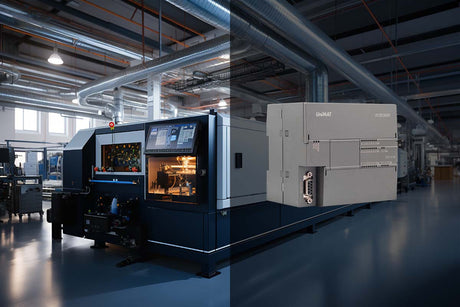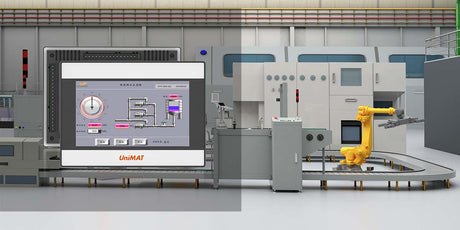Confusion often arises between Human Machine Interfaces(HMI)and touch panels in automation and control systems.While both enable user interaction,their technical architectures and use cases differ fundamentally.This article clarifies their distinctions,highlights industrial requirements,and recommends Unimat’s cost-effective HMI panels with free software for seamless integration.

1.HMI vs.Touch Panel:Core Technical Differences
| Feature | HMI (Human Machine Interface) | Touch Panel |
|---|---|---|
| Definition | Integrated hardware + software control system | Touch-enabled input/display device |
| Primary Function | Data monitoring, logic control, protocol communication | Basic touch input and visual feedback |
| Application Scope | Industrial automation (PLCs, production lines) | Retail, kiosks, consumer electronics |
| Software Dependency | Requires HMI-specific configuration tools | Relies on external OS (e.g., Windows, Android) |
| Hardware Complexity | Built-in processor, multi-protocol support | No independent processing unit |
| Durability | IP65/IP67 rated, wide-temperature operation (-20°C–70°C) | Commercial-grade protection |
2.Why HMIs Are Essential for Industrial Automation
Real-Time Control&Integration
HMIs directly communicate with PLCs,sensors,and drives via industrial protocols(Modbus,Profinet,CAN bus),enabling closed-loop control.Touch panels lack native protocol support,requiring additional middleware.
Ruggedized Design
Industrial HMIs feature shock-resistant casings,EMI shielding,and dust/waterproofing to withstand harsh environments—critical for factories,energy plants,and outdoor installations.
Advanced Functionality
HMIs support alarm management,data logging,and remote access,aligning with Industry 4.0 standards.Touch panels focus on basic UI/UX without embedded control logic.
3.Unimat HMI:Budget-Friendly Industrial Automation
For SMEs seeking reliable automation without high costs,Unimat HMIs deliver exceptional value:
Key Advantages:
Free Configuration Software
Unimat’s HMI Studio Suite includes:
150+prebuilt industrial widgets&PLC templates(Compatible with Siemens)
Drag-and-drop logic builder for rapid deployment
Multi-language support&cloud connectivity
High Performance,Low Cost
Triple interface:RS485,Ethernet,USB-host
Open Compatibility
Integrates with 90%of PLC brands and IoT platforms.Free technical support ensures smooth setup.

4.How to Choose Between HMI and Touch Panel
Choose HMI If:
You need real-time control,protocol communication,or data logging.
Operating in environments with dust,vibrations,or extreme temperatures.
Choose Touch Panel If:
Building a simple UI for non-industrial applications(e.g.,POS,interactive displays).
The host system(PC/PLC)already handles control logic.
Upgrade Smartly:Explore Unimat’s HMI product line to claim a free PLC integration toolkit with expert guidance.Optimize your automation workflow today!









